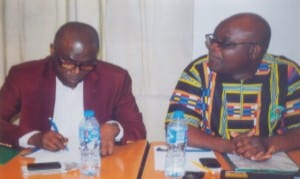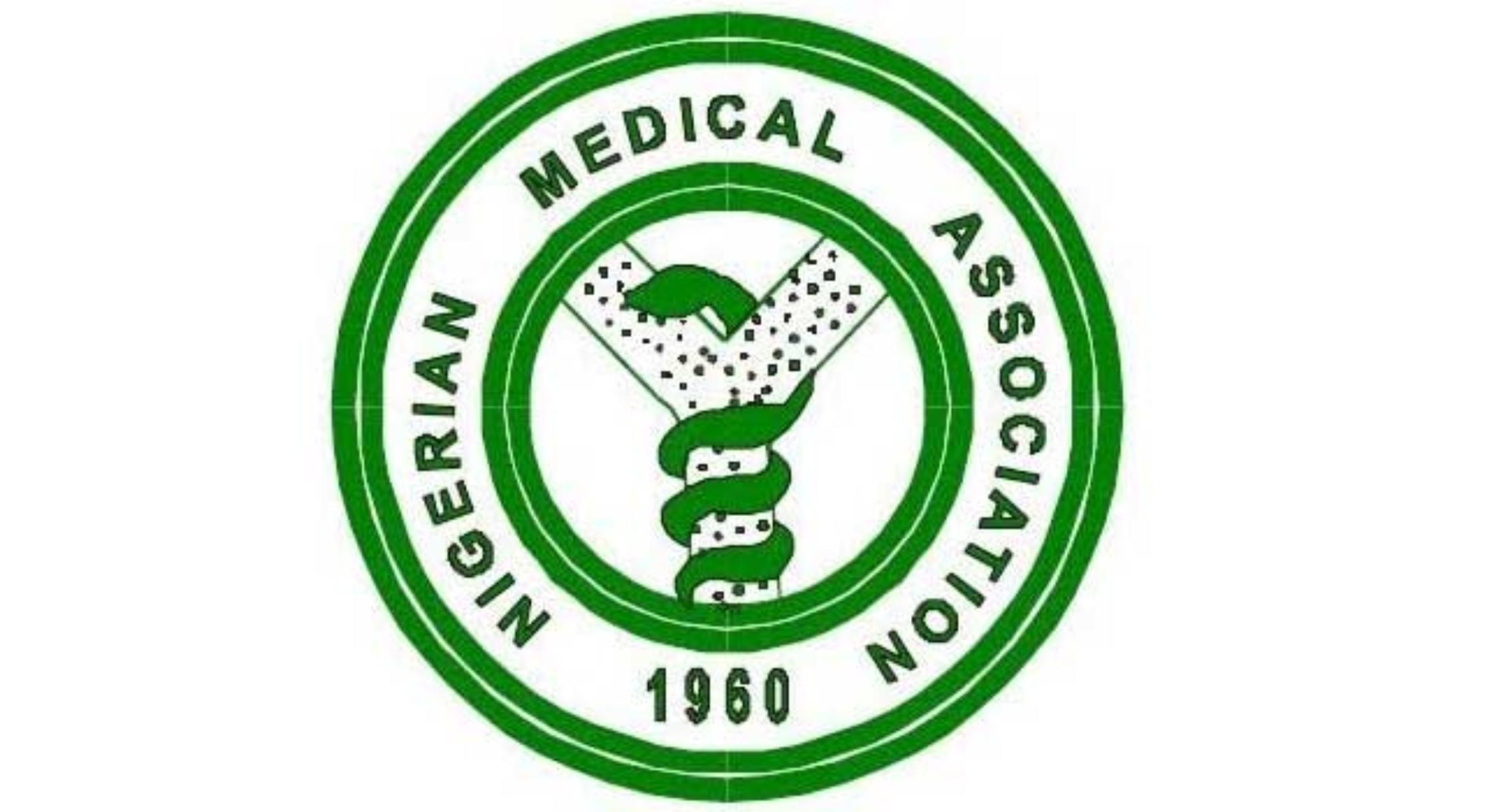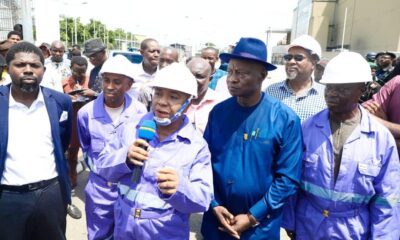Oil & Energy
Obio Hospital:How RSG, SPDC Set New Health Standard

Prof Abiodun Ilesanmi and SPDC Regional Manager of Community Health, Dr Babatunde Fakunle, during
5 years celebration of Obio Cottage Hospital at Novotel Hotel, Port Harcourt, recently. Photo: Obina Prince Dele
The recent World Bank
rating of one of the cottage hospitals in Rivers, the Obio Cottage Hospital (OCH) in Obio/Akpor Local Government Area, as a model, in healthcare delivery not only in Nigeria but the world at large, was indeed a cheering news to the people and residents of the state and the nation.
World Bank said, a thorough investigation based on universal indicators on access to efficient and effective healthcare services to community members through sustainable operated healthcare facilities, Obio hospital came out with impressive result compared to what obtains in other healthcare facilities in Nigeria in particular and in the world at large.
Disclosing this at the fifth anniversary of OCH recently in Port Harcourt, Dr Olumide Okunola representing the International Financial Corporation/World Bank said the outcome of the research was heartwarming and attributed it to the approach of Community Health Insurance Scheme which gave the community people sense of ownership of the facilities.
“He said World Health Organisation (WHO) ranked Nigeria’s health system first out of 191 countries, with data indicating that Infant Mortality (110 deaths/1000 live births) and maternality (1500/100000 live births) rates being among the worst in the world. More disturbing was the fact that 70 per cent of the health care expenditures are out of pocket expenses by those who could ill afford it.
Out of concern for the high cost of health services especially in the oil-rich Niger Delta, Communities under its 1A cluster, Shell Petroleum Development Company of Nigeria (SPDC), the Rivers State Government sought a more effective healthcare delivery for the people and residents of the IA Cluster communities and came up with Community Health Insurance Scheme (CHIS) and signed an operational Memorandum of Understanding (MoU).
Under this CHIS initiative, with a paltry N10,000 enrollment fee per person, per year, one enjoys comprehensive primary and secondary care, including caesarean section and in-patient care, home visit termed healthcare at the doorsteps as well as other numerous client support services.
This is a far cry of what obtains today in other health institutions, both private and public are considered.
The success story is that Obio Cottage Hospital which, like other public health centres, grew from a facility concerned with mere immunization centre has 45,000 enroled persons, 3488 safely delivered babies in 2014, with an average of 270 monthly as against 10 before the scheme. It also recorded 3,108 caesarean sections, 1243 surgeries and 100 per cent uptake of ante-natal care, HIV counseling and testing, amongst other impressive records.
Excited by the success of the scheme, the Executive Secretary, Rivers State Primary Health Care Management Board, Dr Claribel Abam described the feat as an amazing milestone in five years of uninterrupted community-based health insurance scheme implementation in the Niger Delta. She commended the stakeholders for making one of the state’s facilities take a pride of place not only in Nigeria but in the world.
Abam, in her comment at the occasion said, “with the community-based Health Insurance Scheme, Obio is now a reference point both nationally and internationally”, and stressed that since the inception of this scheme in 2010 the facility has recorded a progressive increase in the number of clients while the state government’s health personnel which form part of the effort have built capacity and become role models in efficient management of health systems.
Reactions from some international figures who paid visitations to OCH based on the wonderful record set, show expressions of satisfaction and amazement.
“Fantastic!! Great Ambience, Committed Staff, well stocked pharmacies, efficient record keeping and great public, private partnership. A model for Nigeria”, said a Senior Health Specialist of the World Bank, Dinerh Nav.
A Member of Parliament, in United Kingdom and Secretary All Party Parliamentary Group, Nigeria, UK Parliament, James Doddridge said, “I was amazed to see so much being achieved in one small site. This clinic is truly a model for healthcare, not just in Nigeria but worldwide”.
Tracing the origin of the CHIS, the Chairman 1A Cluster Development Board, Chief Joseph Amadi, said the beginning was tough and challenging especially with the board not knowing where to raise fund. “But with the little we had, the people were enthusiastic and Shell was a willing technical partner and great support from the Rivers State Government”.
Amadi expressed joy that just like a mustard seed, the initiative began to grow from grass to grace such that today it has become one initiative viewed by even the World Health Organisation as a model and the way to go in the effort of delivery quality and efficient healthcare services to the people.
The board chairman explained that provision of standard healthcare particularly to the poor rural people is a challenge in view of the high cost of medical services today and stressed that the CHIS idea is a clear proof that such rural people can be assured of quality health services if they pool their little resources under Community Health Insurance System.
“It requires an all inclusive involvement of the people, the government and other partners and a clear understanding of the importance of dependence of one another is paramount for the success of any such scheme. I am happy so also the people and other partners that today the scheme is a total success worth emulating”, he stated.
The Regional Community Health Manager, Community Health Department SPDC, Dr Babatunde Fakunle said as part of SPDC’s commitment to the quality health of its host communities (Shell Industrial Area (1A) it partnered with the people, Obio/Akpor Local Government and the Rivers State Government to launch Niger Delta’s first Community Health Insurance Scheme (CHIS) was introduced for indigenes and non-indigenes resident in the 1A communities consisting of Oginigba, Rumuobiakani, Rumuomasi and Rumuozeolu, using Obio Primary Healthcare Centre as the healthcare provider for the scheme.
Fakunle said Obio Cottage Hospital through the CHIS has become a big success and that the scheme has proved itself a wonderful initiative and we are interested in getting it replicated in our other host communities to boost healthcare in the Niger Delta.
The Chief Medical Director of Obio Cottage Hospital, Dr Umejiego Chigozie said the success so far recorded is not the end point because it is about quality, noting that when you set a high standard, the challenge is how to sustain the record set so that you do not fall back.
He said Obio is extending services to other centres around with surgeries and other complex services to enable them enjoy the quality services as found in OCH.
On those poor persons who still are unable to afford the N10,000 enrollment fee, the CMD said there is Indigenes Committee put in place and that the committee investigates such complaints and if actually such people are unable to afford, a special fund set aside annually would be used to complement the shortfall from those who are unable to afford the official enrollment fee of N10,000 per person per year.
He also disclosed that the centre is undergoing expansion in terms of structure and facilities to contain the growing number of persons enrolling and for improved services.
To complement the regular power outages in public electricity supply, the CMD also revealed that wind and solar energy systems have been installed.
“The green energy project is an economically friendly, power dependable and efficient solution to modern day hospital requirement for our environment. It ensures an uninterrupted power supply 24 hours as Analysts believe that with the over one hundred primary health centres built across Rivers State by the Governor Rotimi Amaechi’s administration, the Community Health Insurance initiative could be a wonderful complete to high quality and efficient healthcare service delivery.
Chuma Akazie advised the Rivers State Government and other state governments in the Niger Delta region to include the Community Health Insurance in their system.
Akazie, a business consultant said the people especially the low income earners would enjoy same high quality healthcare as provided by OCH if they pool their resources and risks together in the insurance scheme.
“Today, large number of the poor masses besiege spiritual homes, unorthodox practitioners for their health challenges because of the high cost of drugs and other health services. And this systems have resulted in many avoidable deaths which could otherwise by resolved through the Community Health Insurance initiative.
The impact of the initiative has elected the Obio Cottage Hospital to a medical research centre as record shows that both Braithwaite Memorial Hospital (BMH) and University of Port Harcourt Teaching Hospital (UPTH) have signed Memorandum of Understanding with OCH in research relating to attitude of staff while not less than 20 publications and abstracts at various levels of medical researches including PHD students are so far recorded.
Chris Oluoh
Oil & Energy
NSCDC’s Anti-Vandal Squad Uncovers Artisanal Refinery In Rivers Community

The Anti-Vandal Squad of the Nigeria Security and Civil Defence Corps (NSCDC), Rivers State Command, has uncovered yet another local refinery situated at Adobi-Akwa settlement in Etche Local Government Area of Rivers State.
The State Commandant, Basil Igwebueze, disclosed this while speaking to journalists shortly after the tour of the Illegal site.
Represented by the Head, Anti-Vandal Squad, CSC Peters Ibiso, Igwebueze said the squad made the discovery following a tipp off, expressing regret that no arrest was made as the boys fled the site upon sighting the squad.
The cammandant’s representative took the newsmen across a tick forest of about 6-7 kilometers from the main town.
The team sighted where the pipeline vandals tapped into the Well Head of yet to be ascertained multinational company, connected their galvanised pipes to several cooking pots, heat up the crude to produce Automotive Gas Oil (AGO).
In his words, “Upon receiving a tip-off, the Anti-Vandal operatives swung into action to uncover this illegal oil bunkering site. They were in this forest for two days having cordoned the area, unfortunately, the perpetrators upon sighting our men took to their heels, but investigation is still ongoing to effect the arrests of such defiant elements”.
The Anti-Vandal Unit Head further narrated the operation techniques of the operators of local illegal refineries from the point of extraction of crude through vandalism of oil pipelines to cooking in various ovens where the content is subjected to high temperature and transmitted through pipes to reservoirs for storage and onward trans- loading to buyers.
While insisting that the command would not relent in the fight against illegal dealings in petroleum products, he urged the public to have more trust in the NSCDC by providing actionable intelligence that would enhance possible arrest of economic saboteurs in the State.
“Our commitment to continuously work in tandem with the prosecutorial mandate of the corps in order to rid the State of economic saboteurs remains unchanged. We value our informants and most especially the intelligence driven tip-off received from time to time.
“It is also our duty to ensure that our source of information are not disclosed so as to protect our informants. It is therefore our delight that the public will continue to have confidence and trust in us as we together protect the nation’s critical national assets and infrastructure from dare devil vandals”, he stated.
By: Lady Godknows Ogbulu
Oil & Energy
Oil Fund Withdrawals Suggest Extended Price Rally

The world’s largest crude oil exchange-traded fund has bled over $2 billion in less than a year. And it i
s not due to investors finding greener pastures elsewhere with other ETFs; it is the siren call of soaring prices that is prompting this mass exodus.
The WisdomTree Brent Crude Oil exchange-traded commodity had assets under management of some $2.5 billion last summer, according to Bloomberg. Now, the publication reports, this is down to $396 million, with withdrawals accelerating over the past few days.
In that, withdrawals seem to be following price trends. Brent earlier this month topped $90 per barrel and, after a short pause earlier this week, is back above that threshold again following the latest Israeli strike on the Gaza Strip amid reports about a possible ceasefire.
While it is true that prices are currently driven higher mainly by geopolitical events, fundamentals are also at play. A growing number of forecasters are updating their predictions for benchmarks this year on expectations of resilient demand and increasingly tighter supply. And investors are following the trend.
Even those who have not sold their ETF holdings in order to invest more directly in the rally are benefitting. That same WisdomTree Brent Crude Oil ETC generated returns of over 13 percent during the first quarter of the year as opposed to an average 8.8% gain in the S&P 500.
The WisdomTree exchange-traded commodity became the world’s largest oil fund at the beginning of last year. The fund saw inflows of over $1 billion, which poured in as the deflation in oil prices that had begun in late 2022 extended into the new year. Now, the trend has reversed and it has reversed strongly.
The WisdomTree Brent Crude Oil ETC is not the only fund seeing outflows. The U.S. Oil Fund, which used to be the world’s biggest oil fund before the WisdomTree inflows last year and is now the world’s biggest oil fund once again, also saw a flurry of investor exits as benchmarks climbed higher.
According to Bloomberg, the fund’s assets under management currently stand at $1.3 billion, down from some $5 billion during the pandemic.
In further evidence that oil makes money, the Middle East is about to become the only region in the world with three trillion-dollar sovereign wealth funds. The Abu Dhabi Investment Authority is worth $993 billion, Bloomberg reported in March, while the Saudi Public Investment Fund and the Kuwait Investment Authority are breathing down its neck.
Meanwhile, investment in transition-related stocks is on the decline, according to data reported by Reuters. The S&P Global Clean Energy Index is down by 10% since the start of the year. In comparison, the S&P 500 Energy Index, which comprises Big Oil names, has gained 16.3%.
The data shows that investors are growing wary of all the promises made by transition advocates as evidence mounts that these were not based on due diligence. Wind and solar stocks suffered a crash last year when this first became clear.
Now, we are witnessing a continued awakening among investors to the challenges and the realistic potential of transition technology and alternative energy sources.
“With conventional energy having its own bull run, I think the alternative funds will struggle for the foreseeable future, and we shall see what the election brings”, the Managing Director of capital markets at Phoenix Capital Group Holdings told Reuters.
The comment summarizes the challenging situation for alternative energy investment and highlights the rebound of interest in oil and gas, much to the chagrin of decision-makers on both sides of the Atlantic.
In both Europe and the U.S., things can get even worse for the transition after the respective elections—in June for European Parliament and in November for U.S. President. It will certainly be an interesting year in energy.
Slav writes for oilprice.
By: Irina Slav
Oil & Energy
CNG Initiative: FG Targets 25,000 Jobs, $2.5bn Investment

The Programme Director and Chief Executive, Presidential Compressed Natural Gas Initiatives, Michael Oluwagbemi, has announced the Federal Government’s plan to target over 25,000 jobs and $2.5 billion worth of investment by 2027.
Oluwagbemi made this known during the Presidential CNG stakeholders’ engagement workshop held at BOVAS Auto-Gas Filling Stations, Ajibode Bus-Stop, in Ibadan, Oyo State capital, at the weekend.
He stated that the initiative, which was part of palliative measures to ease the burden of the removal of fuel subsidy, would attract enormous investment and job creation as well as impact positively on the lives of Nigerians.
Meanwhile, he called on Nigerians to embrace the new initiatives by the Federal Government as part of palliatives to cushion the effect of the removal of fuel subsidy in the country.
“On October 1, 2023, when the President gave his speech, he announced that the Presidential CNG initiatives are going to be rolled out as part of palliatives on the removal of fuel subsidy.
“One of our major concerns is to make sure that the transition for the transportation sector is a cheaper, safer, and more reliable source of energy.
“In the coming weeks, we are going to be announcing the conversion incentives programme which will enable Nigerians currently using PMS and Diesel fuel vehicles to be able to convert their vehicles at designated places across the country at a discounted price based on certain pre-qualification under the palliative programme of the Federal Government”, he said.
On the value chain of the initiative, Oluwagbemi explained that the Federal Ministry of Finance is acquiring tricycles and buses that would be assembled and manufactured in Nigeria, with more than five automobile firms being activated.
“The value chain of the programme starts with every one of us. From the point of converting your vehicle, you have created the demand for natural gas.
“If your vehicle is converted by technicians and refuelled by autogas workshops across the country, then you are creating jobs for civil engineers and technicians. You’re creating jobs for the upstream in terms of upstream activities associated with oil and gas.
“And in line with the programme, the Federal Ministry of Finance is acquiring a number of tricycles and buses that will be assembled and manufactured in Nigeria. More than five of our automobile firms have been activated. So, you can see that in terms of job creation, the opportunities for Nigerians are enormous.
“The President has said we need to convert one million vehicles by 2027. We need 1,000 conversion shops and we need over 3,000 filing stations just like this. You can imagine the level of investment required for this.
“In order to sustain one million vehicle conversions by 2027, we need 25,000 technicians. So, the job creation potential is an opportunity for job creation in addition to our gross domestic product, $2.5 billion worth of investment to be mobilised in the next four years and of course more than $25 billion added to our GDP”, he said.
Oluwagbemi further called on Nigerians to embrace the new initiatives by the Federal Government as part of palliatives to cushion the effect of the removal of fuel subsidy in the country.
The representative of BOVAS Filling Station, a private investor in the Presidential CNG Initiatives, Temitope Samson, said, “We have worked with the regulators, we are also working with the Presidential Initiatives on CNG to make sure that standard safety is adhered to. We have also worked with the Standard Organisation of Nigeria to ensure that we have a standard accepted internationally.
“Our role is to ensure that there is availability of CNG across the nation, and to also ensure we have enough kits and tanks that are converted for people to use as many as possible, and to ensure safety and to train others so that anywhere they get to, they have very safe conversion”.
Recall that last year, President Bola Tinubu approved the Presidential Compressed Natural Gas initiative(PCNG-i)
This initiative aims to not only introduce more than 11,500 new CNG-enabled vehicles and provide 55,000 CNG conversion kits for existing vehicles that depend on Premium Motor Spirit but also promote local manufacturing, assembly, and job creation.
-

 Niger Delta2 days ago
Niger Delta2 days agoRSG Seals Two Hospitals In Bonny …Set To Inaugurate Anti-Quackery Committee
-
Entertainment2 days ago
Davido Narrates How His Song Became President’s Ringtone
-

 News2 days ago
News2 days agoN5.2trn Debt: FG Recovers N57bn From 10 MDAs
-

 Editorial2 days ago
Editorial2 days agoThat Odili’s Health Centre Gesture
-

 News2 days ago
News2 days agoBonny-Bodo Road: FG Offers Additional N20bn, Targets December Deadline
-
Business2 days ago
Nigeria Set To Get $2.25bn World Bank Loan … Plans Diaspora Bond
-

 Niger Delta2 days ago
Niger Delta2 days agoMile One Market: Committee Commences Verification Exercise …Denies Allocations Of Shops
-
Sports2 days ago
Chairman Lauds NPFL Referees Improvement

